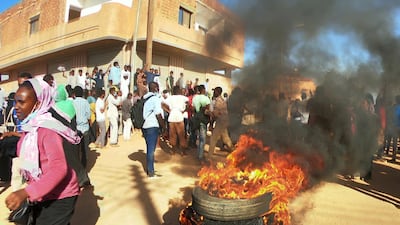Hundreds of Sudanese protesters demonstrated in Khartoum's twin city Omdurman on Monday after one person died of wounds suffered at an anti-government rally last week.
Angry mourners chanted against the government as the body of Al Fatih Omar Al Nimeer, a final-year engineering student, was brought home from the hospital where he died after being wounded in the east Khartoum neighbourhood of Burri on Thursday.
"People are chanting freedom, freedom and overthrow, overthrow as they gathered for the funeral of the protester," a witness told AFP.
Another protester, a doctor, also died in those clashes. On Monday, about 150 doctors held a silent sit-in to protest the death of Babiker Abdelhamid outside the Khartoum hospital where he used to work.
A month of largely peaceful protests demanding the resignation of Sudanese President Omar Al Bashir is posing perhaps the greatest challenge to the autocratic leader since he seized power in a 1989 coup, and show no sign of abating.
Officials say 26 protesters have died so far. Opposition group the Sudanese Communist Party says 47 have been killed.
The protests began on December 19 after the government cut bread subsidies, and despite a violent crackdown by the country’s security forces have lasted longer than previous protests in 2012 and 2013.
The Sudanese Professionals Association, an umbrella group of outlawed independent unions that have broken away from the state-controlled syndicates, is organising the protests. The involvement of the country's educated classes is significant, analysts say, given their role in bringing down previous Sudanese governments in 1969 and 1985.
Protesters say they have learnt to plan marches and to organise on social media from watching the 2011 Arab uprisings, which toppled the government of neighbouring Egypt. "We have used tactics employed by the Egyptians, Tunisians and Syrians but we have so far refrained from pelting security forces with rocks or firebombs," one protester told the Associated Press.
Security forces have not shown such restraint, using teargas, rubber bullets and live ammunition to disperse protesters. Emergency laws and night-time curfews have been imposed in some cities, while in others classes at schools and universities have been suspended.
Authorities have imposed a media power cut on local coverage of the protests, and also blocked access to social media while apparently restricting 3G networks during protests. The media crackdown was extended on Tuesday, as security officials withdrew the work permits of Al Jazeera correspondents in the country, according to the Qatari channel.
Security forces have arrested hundreds of protest leaders, doctors, lawyers, journalists and students. National Intelligence and Security Service forces have been accused of cutting female protesters' hair, threatening detained female protesters with rape and reportedly torturing prisoners to reveal the names of protest leadership. "The police in uniform are restrained compared to NISS forces," said one protester who spoke to The National.
Mr Al Bashir has publicly ordered an investigation into “recent events”, referring to protester deaths, but also insisted that security forces were not responsible for all of them. A similar probe into the death of protesters in 2013 came to nothing.
Despite the United Nations High Commissioner for Human Rights Michelle Bachelet expressing her concern about the use of excessive force against the protesters, regional powers, including immediate neighbour Egypt, is so far sticking with Mr Al Bashir in the name of stability.
As the protests continue, Mr Al Bashir travelled to Qatar on Tuesday to meet Emir Sheikh Tamim bin Hamad Al Thani. The two leaders were scheduled to meet on Wednesday to discuss ways to promote "fraternal relations", state media reported.
_______________
Read more:
Sudan's professionals lead calls for Omar Al Bashir to step down
Persistent protests testify to deep-rooted anger in Sudan
_______________
Despite the duration of the demonstrations, protest numbers have so far mostly been in the hundreds, rather than the tens or hundreds of thousands who took to the streets in Tunisia and Egypt in 2011.
But protesters say their movement is gaining momentum. "All that we do now is to prepare Sudan's streets, so when zero hour arrives, the entire country will be ready to go out on the streets," Aseel, 25, told AP.

